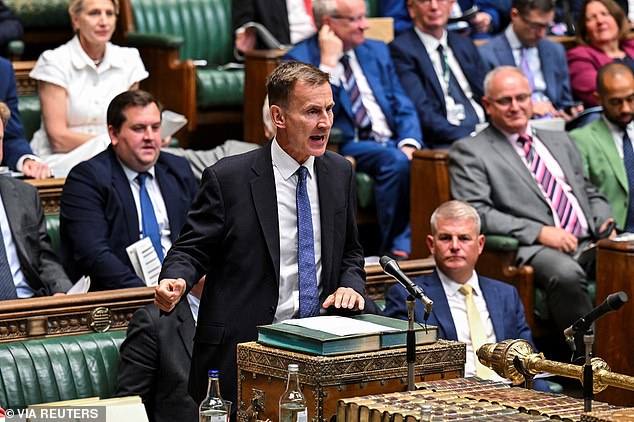With her dogmatic and dishonest spin, Rachel Reeves threatens to destroy her growth agenda, writes ALEX BRUMMER
The Labour mask has fallen. And the voters who gave Sir Keir Starmer such a comfortable majority are left with the ugly face of cheap politics – skewed priorities and partisan giveaways.
How can a massive £9.4 billion payout to Labour-supporting public sector unions be seen as anything other than cynical?
And why is a government that has promised to rebuild Britain for all its citizens protecting the billions we spend on asylum seekers instead of our own pensioners?
Yet the worst aspect of the hollow political theatre we saw on Monday with Chancellor Rachel Reeves’ “spending audit” was barely mentioned: the betrayal of the productivity and prosperity that Britain so desperately needs.
The new government claims its core task is to ‘restore growth’ – and so it is. The nation would be delighted if Britain’s first female Chancellor of the Exchequer succeeded.
Chancellor of the Exchequer Rachel Reeves speaks in the House of Commons on Monday

Jeremy Hunt, now shadow chancellor of the exchequer, reminded us that Britain saw growth again in the first two quarters of the year (pictured on Monday)
Miserable
But instead of addressing the country with optimism, Reeves was needlessly and destructively miserable.
For example, she claimed to have inherited the weakest economy since 1945, which is simply not true. She uncovered a Tory cover-up when there was no such thing. And as for the stable and growing economy bequeathed to her by former Tory Chancellor of the Exchequer Jeremy Hunt… not a word.
Reeves has chosen to pretend that our improving economic picture is a mirage. But as Hunt, now shadow Chancellor of the Exchequer, has reminded us, Britain has grown again in the first two quarters of the year. After a difficult period, the economy is recovering.
Only yesterday, Lloyds Bank reported that business confidence has reached a seven-year high. Inflation has returned to the Treasury’s 2 percent target – a remarkable achievement given where we were. Government borrowing is on a downward trend and Britain’s debt levels – below 100 percent of national income – are lower than those of the US, Japan, France and Italy.
The Conservative Party’s long-term, baked-in tax rises and Starmer’s election victory had already provided the stability that City traders (and particularly the bond markets) craved.
The government’s finances are far from disastrous. Yet Reeves is obsessed with what she calls “fixing the foundations.” It shows that the new occupant of Number 11 is nothing more than a fiscal obsessive who lives in fear of financial markets, which is why she has chosen to scrap major infrastructure projects and beat savers—an attack on two key engines of future prosperity.
The false catastrophe that Reeves ‘discovered’ is simply an excuse to raise taxes even further – taxes that already eat up 37 per cent of national income – to buy peace with Labour’s union bosses.
There is a risk that the Chancellor’s generosity, particularly towards the difficult young doctors, will only provoke competing demands from other colleagues in the NHS.
One of the most astonishing things is that Reeves’ dismal audit runs counter to the promises the administration made in the first three weeks of the inquiry to boost economic growth.
On her first day at the Treasury, for example, Reeves gathered leading figures from business and the City to tell them that Labour would drive a carriage and horses through Britain’s planning system to build 1.2 million homes. A new “National Wealth Fund”, designed by former Bank of England governor Mark Carney, would free up private-sector money and investment. Ed Miliband’s Great British Energy would bring about a green industrial revolution.
I now fear that such initiatives will fade into the background, thanks to Reeves’ misplaced determination to be – and be seen as – an iron chancellor.
The signs are already far from encouraging. One of the keys to expanding the UK economy, for example, is improving our infrastructure, so that people and goods can move more efficiently.
So it is an act of sabotage to scrap the very projects that could break through Britain’s weak productivity.

Axed: The Chancellor told MPs the government will scrap several transport schemes, including the A303 tunnel at Stonehenge (pictured)
Reeves has decided to cancel a number of fanciful transport schemes, including the controversial but much-needed A303 Stonehenge tunnel, in a major blow to the struggling South West economy.
A major bypass on the A27, a key route to the valuable port of Southampton, has also been cancelled. Funding to restore previously scrapped and abandoned railway lines has been cut.
And there is no mention of what the government plans to do about connecting the stump of the HS2 high-speed link to Birmingham, from where it currently ends – a station at Old Oak Common, west of London – to the centre of the capital, where people want to go.
If Reeves’ £22bn budget deficit is to be taken seriously, then the £5.5bn in cuts in the 2024-25 budget year announced this week, plus the £8.12bn in reduced spending forecast for 2025-26, cannot be enough.
Sabotage
Labour’s manifesto promised not to raise VAT, income tax or national insurance. But taxes will rise regardless.
Reeves has already begun discussions on ending the remaining non-dom status and is proposing to increase taxes on the UK’s booming private equity sector.
Higher capital gains taxes and inheritance taxes are also expected. These would hit ordinary middle-income households. The finance minister is also considering eliminating some of the tax deductions on pension savings.
Attacks on the rich, who have accumulated capital as a result of the sharp rise in asset prices (property and shares) in recent history, will be popular with Labour’s socialist base.
But how will such policies boost growth?
Starmer and Reeves say they want to boost investment in the UK’s brilliant AI, technology, gaming and life sciences industries and revitalise the London stock market.
But taxes on the richest people in society will only drive capital offshore and make it even harder for the new government to unlock the private sector money it seeks for its green revolution. And that’s without even mentioning the new National Wealth Fund that has been set up to finance innovation and breakthrough technologies.
There is one possible glimmer of hope from Reeves’ former employers at the independent Bank of England.
Doubt
Today, the Monetary Policy Committee led by Governor Andrew Bailey begins a meeting where interest rates could be cut from 5.25 percent, now that inflation is under control.
A cut in interest rates would provide a boost to struggling businesses, help households with mortgages and reduce the cost of servicing the UK’s national debt. It would be a huge boost to British manufacturing.
Now, however, Reeves has raised doubts in the City, with concerns that her inflation-busting pay deal for public sector workers will lead to demands from other groups of workers.

The Monetary Policy Committee led by Governor Andrew Bailey (pictured) begins a meeting that could cut interest rates from 5.25 percent
A cautious Bank of England, fearing a ‘wage spiral’, could back down from a decision that is on the knife-edge. Extending a period of higher borrowing costs would, among other things, do immense damage to the government’s ambitious plans for house building.
Reeves has forgotten that the fastest and best way to deal with excessive borrowing is to expand the economy, which in turn increases revenues for the Treasury and reduces social security payments.
The entire growth strategy on which the new government was elected is being undermined by the Chancellor’s dogmatic and dishonest turn.
The danger is not that she will restore the foundations, but that she will destroy them.
Some links in this article may be affiliate links. If you click on them, we may earn a small commission. That helps us fund This Is Money and keep it free. We do not write articles to promote products. We do not allow commercial relationships to influence our editorial independence.
